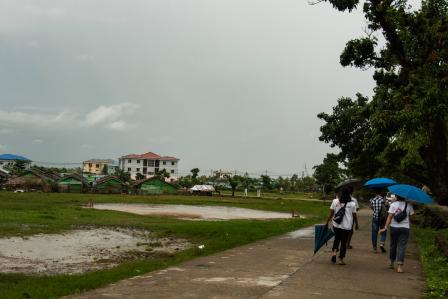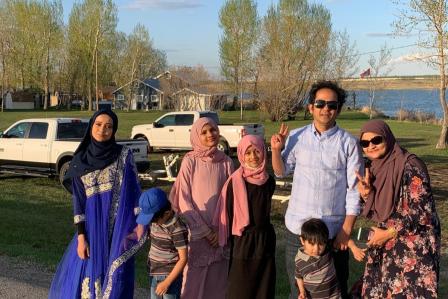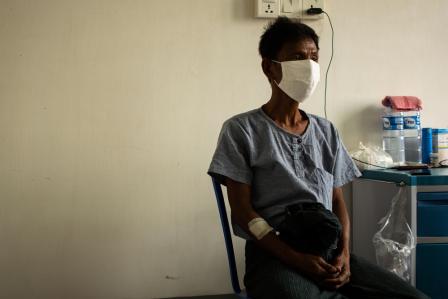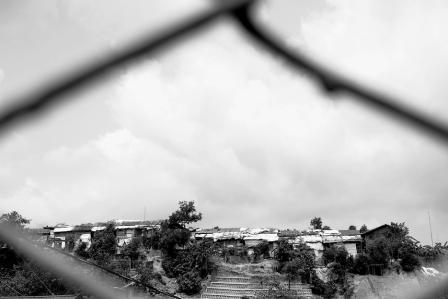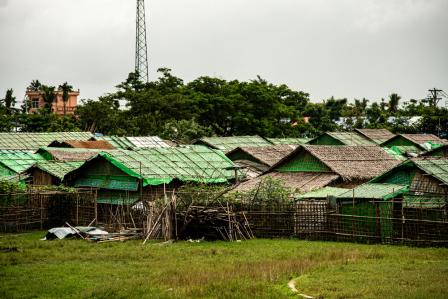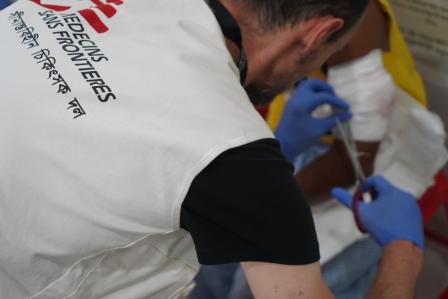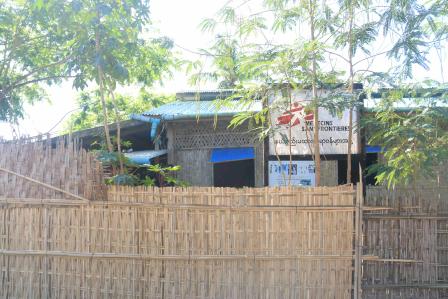Myanmar: Community Health Workers struggle to respond amid severe restrictions in Rakhine state
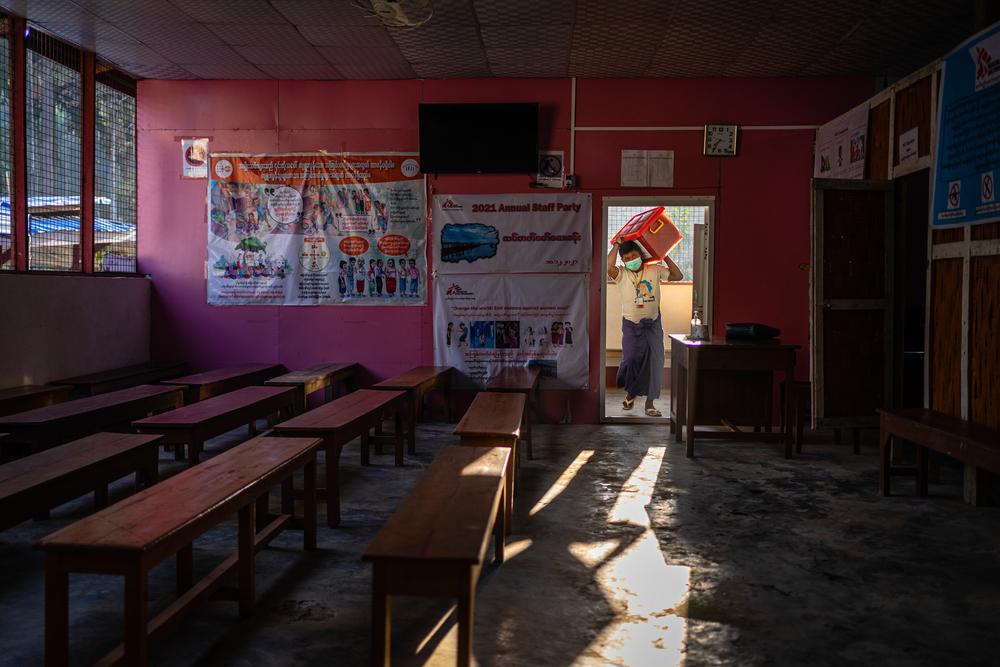
A Doctors Without Borders staff carry supplies into the clinic in Sin Thet Maw village in Pauktaw township. Myanmar, March 2022. © Ben Small/MSF
A new wave of fighting has gripped Myanmar over the past two months. Doctors Without Borders / Médecins Sans Frontières (MSF) is providing medical humanitarian assistance in Shan, Kachin and Rakhine states, and we have witnessed healthcare facilities damaged or abandoned and hundreds of thousands of newly displaced people attempting to flee for safety.
On 13th November the conflict reignited in Rakhine state, breaking a year-long informal ceasefire. Since then, severe movement restrictions are preventing Doctors Without Borders from running any of the 25 mobile clinics that deliver around 1,500 patient consultations a week.
For the past nine weeks, despite our attempts to find solutions to these blockages, such as providing tele-consultations between patients and doctors, Doctors Without Borders’s community health workers (CHWs) are some of the only people with direct access to our patients.
Community health workers provide essential care
Ann Thar Clinic in Min Bya supports over 4,000 internally displaced people from both Rakhine and Rohingya communities, Doctors Without Borders teams have been unable to run the clinic since 13th November. On 17th November, Min Bya General Hospital, a hospital that Doctors Without Borders uses for emergency referrals came under fire.
“My name is Aung Aung*. I am a Community Health Worker (CHW) from Ann Thar clinic in Min Bya under Mrauk-U project. The difference in situation here before the conflict and after the current conflict arose is very clear. I was able to do my work regularly and peacefully before, but after the current fighting, I can’t. Instead, I am constantly worrying that something might happen, feeling insecure while on the street, and detour using the fields. It’s not safe anymore."
"I’m a CHW, so my medical skill set is limited. In situations like these, what I can do is to call the doctors and look after the patients according to their instructions. But sometimes, mobile connections are not working, so I have difficulty reaching them. We try to make it happen every week."
There are patients with non-communicable diseases (NCDs), such as diabetes and hypertension, too, but we don’t have medicines for them now. I’m still unsure how our team is going to arrange it. Currently, we have medicines for antenatal care and epilepsy patients. We can’t say anything for sure about what we can do for NCD patients for now.
Rising petrol prices are one of the major challenges we face as well. If people wanted to go to the town to pay a visit to a clinic it would cost them around 60,000 Ks for a round trip. The town is only five miles from our village. So, the travel cost would be more expensive than their actual healthcare expenses. This rise in cost has happened since the fighting broke out. It was only 2,000 Ks – 2,500 Ks before.
I am worried and concerned for our patients here in the village. In the future, for emergency patients, and for those who need a monthly prescription, they will face a lot of difficulties. As long as the roads are blocked and fighting continues, clinics and pharmacies in Min Bya town will remain closed.”
Severe movement restrictions affecting vulnerable populations
Min Thu is a community health worker in Kyein Ni Pyin camp for displaced people in the Pauktaw area of Rakhine state. Kyein Ni Pyin camp is home to over 7,500 people, most of whom are Rohingya who have been displaced since 2012. Pauktaw has been one of the most severely impacted townships of Rakhine state, confronted by heavy attacks and mass displacement.
The Pauktaw hospital was forced to close and movements in and out of Pauktaw, including to the camps, are practically impossible. Doctors Without Borders and other organisations are facing serious obstacles to provide any form of assistance, and transport of patients in need of life-saving emergency care is increasingly challenging.
“My name is Min Thu*. I’m 33 years old. I am a Community Health Worker (CHW) with Doctors Without Borders who provides health education to the community in the camp, and I help with almost everything including translation for patients during clinic opening days. When there are emergency patients, I refer them to the clinic as well."
"We face challenges in transportation and food because of the current conflict. We do not receive rations regularly and the commodity prices are high."
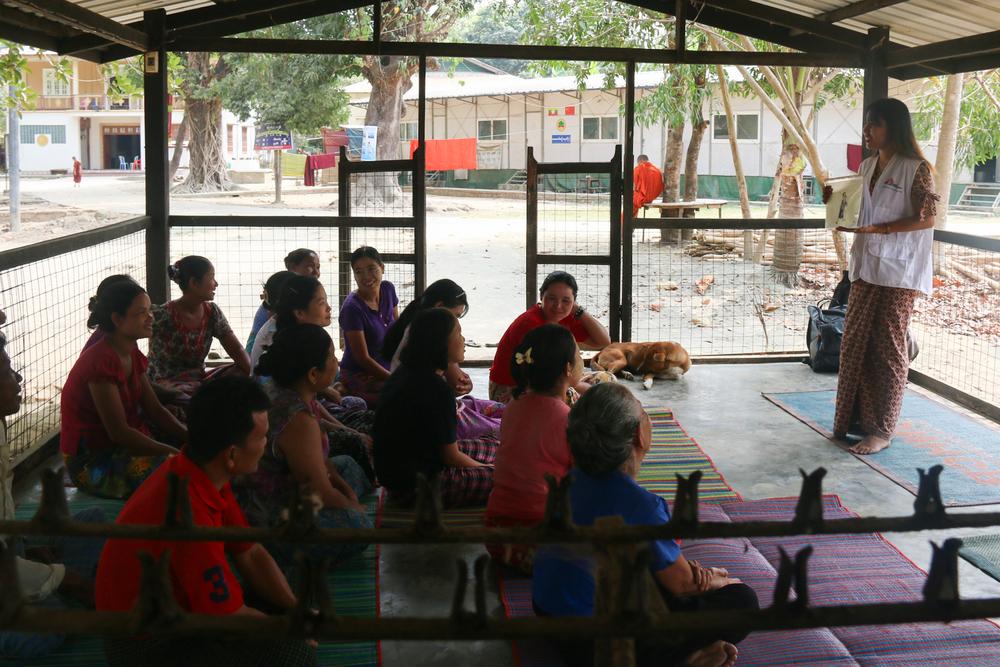
Doctors Without Borders counsellors and community-based health workers provide ongoing support to patients in villages, health clinics, and internally displaced peoples’ camps. This photo was taken before Cyclone Mocha, which has increased the needs for mental health support in Rakhine state. Myanmar, March 2023. © Zar Pann Phyu/MSF
"We were able to move around before the fighting if we informed the authorities of our movement, but now it’s completely prohibited. We are not able to open our clinics like we used to before, which is affecting our patients in many ways."
"For emergency patients, we try to contact Doctors Without Borders doctors on the phone to ask for advice and try following any instructions given by them. However, it is very hard when they cannot see the patients in person, so, the doctors just have to prescribe or advise what to do according to what they hear from the patients, and we just have to follow the instructions over the phone from the doctors and help treat the patients."
"All our staff from Doctors Without Borders’s office in Sittwe do their best to make sure medicines and supplies are safely delivered to us CHWs when they can. We fear for the future. If we continue to not be able to open our clinics due to the travel restrictions and conflict, our patients will be severely impacted.”
Violence is causing high levels of displacement
In Rathedaung, there are many Internally Displaced Persons (IDP) camps very close to the town, where mostly ethnic Rakhine people who have been displaced since 2019 due to past conflict are living. When recent fighting broke out in the area, the people in these camps fled into more rural areas for safety including Doctors Without Borders’s CHWs.
“Currently, there is fighting near our camps. People from the IDP camps in the city area had to evacuate to other places. There was heavy firing near our camps, so everyone had to escape and seek shelter elsewhere, somewhere they think they’ll feel safe, including myself. I am one of the evacuees myself from one camp," says Yan Naing*, Doctors Without Borders Community Health Worker.
"In terms of security, we hear different news every day. We hear things like waterways have been blocked, land transport has been blocked, and some firing from Rathedaung city."
"It’s inconvenient and challenging for us to settle in different places because we’re constantly on the move, and scarcity of basic commodities has its negative impact on us as well. [When we are displaced] there is also no electricity, so we have to conserve our phone batteries."
"I don’t think we can go back to the city yet due to the intense clashes. People are afraid to move around because we hear rumours from other areas about civilians getting arrested or being used as human shields."
"We have patients with non-communicable diseases in our camps, and they are some of our regular patients. They have been coming to our clinic for a long time. {Now that the clinic cannot run because of the restrictions}, I had to reach out to our doctor and discuss if we could provide medicines for these patients when they run out of them."
"Since there are transportation blockages, patients who need to go the clinic might not be able to do that. Shortages in food supplies are also impacting people. My only concern right now is about health and food for the people.”
Unprecedented level of violence across Myanmar
The level of violence across Myanmar in the last few months is unprecedented and is severely impacting people living in and around the fighting areas where life-saving services are either non-functional or limited and dangerous to reach.
In Rakhine state, communities are already heavily reliant on humanitarian assistance and live with imposed restrictions that limit their freedom of movement. Assistance that was permitted in the state before the conflict was lifesaving, especially for communities in many of the rural areas which our mobile clinics were serving, and who otherwise have no other affordable options for medical care.
Access for humanitarian organisations into Rakhine state has always been meticulously controlled, but the continuation of these current blockages will have a catastrophic impact on people’s health.
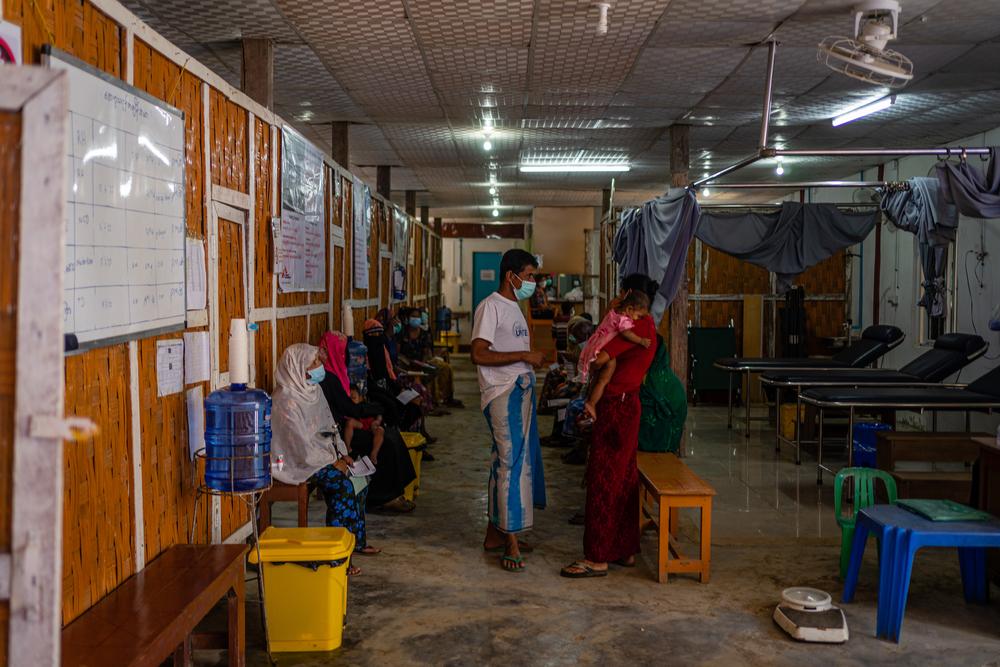
Reproductive healthcare patients wait to be seen in Doctors Without Borders’s clinic in Sin Thet Maw village in Pauktaw township. Myanmar, March 2022. © Ben Small/MSF
Our community health workers are seeing patients lacking their regular medication and with difficulties speaking to doctors, patients being blocked from accessing secondary healthcare, and not being able to afford to access healthcare services further away. According to the latest data from the Global Camp Coordination and Camp Management cluster there have been over 120,000 newly displaced people in Rakhine since 13th November, and this number shows no sign of slowing down.
Hospitals in central Rakhine have been hit during heavy firing or abandoned by staff forced to flee the area. Two hospitals in Central Rakhine where Doctors Without Borders teams usually take emergency patients are no longer functioning, while another, Min Bya General Hospital was damaged on 17th November.
In northern Rakhine, some emergency referrals have been possible through the support of our community health workers. Health facilities are operating, but some are functioning with only a skeleton staff and limited medical supplies, or else they are shifting their resources into more remote areas to support displaced people moving to and from locations looking for safety.
With access routes blocked and without authorisations to provide assistance, Doctors Without Borders cannot run its 25 mobile clinics. These restrictions are impacting other humanitarian organisations too, with many reporting they cannot deliver their regular interventions. Parties to the conflict should ensure that healthcare facilities and humanitarian workers can continue to operate and must guarantee safe access to healthcare for the Rakhine population.
*Names changed to protect identity.
This article is available in Burmese. Click to read.
